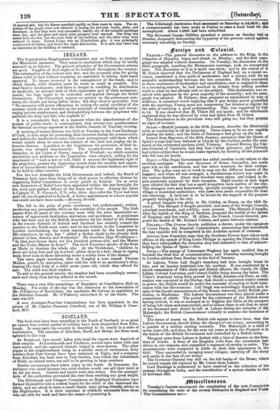IRELAND.
The Reproductive Employment Committee met on Friday, to consider the Ministerial measures. They came to resolutions which may be briefly summed up as follows. The general principles of the Government scheme are good. Supplies of food ought to be localized throughout the country. The termination of the Labour-rate Act, and the proposed plan for giving direct relief in food without requiring an equivalent in labour, both merit approval. To insure economy in the management of the funds, and to check frauds, relief districts must be made as small as possible. The seed-fund is inadequate; and there is danger in confiding its distribution to landlords, on account both of their supineness and of their embarrass- ments: the loan ought to be extended, and applied through the Relief Committees. The Committee express no opinion on the permanent mea- sures, the details not being before them; but they observe generally, that "No measures will prove efficacious in raising the social condition of the country which are not founded on the principle of stimulating and encou- raging private employment, and distinguishing between the proprietor who performs his duty and him who neglects it."
It is a remarkable fact, at a moment when the abandonment of the system of public works is contemplated, that twenty-two proclamations for baronial meetings appeared in the Dublin Gazette of Tuesday evening. A meeting of tenant-farmers was held on Tuesday in the Corn Exchange of Cork, to take steps for protecting their interests during the present crisis, and induce the landlords to enter into some arrangement with them which would enable them to renew the culture of the land and employ the la- bourers thereon. A petition to the Legislature for protection of their in- terests was adopted unanimously. The tenant-farmers also met, on Saturday, in the Union of Gorey, county of Wexford; on which occasion resolutions and petitions to the Legislature were adopted, calling for the enactment of "such a law as will, while it secures the legitimate right of the proprietor, protect the improving tenant from the severity and oppres- sion of inconsiderate landlords." Meetings of the tenant-farmers are about to be held in other counties.
For the last fortnight the Irish Government, and, indeed, the Board of Treasury here, have been doing all in their power to alleviate distress by organizing Relief Committees in every parish in Ireland. Six or seven new Inspectors of Relief have been appointed within the last fortnight, for the most part gallant officers of the Army and Navy. Among the latter is Captain W. N. Glascock, R.N., who, three days after the Tyne had been paid off, was despatched to Ireland. A better appointment or a more popular 0318 could not have been made.—Morning Herald.
The fall in the price of grain continues; but, unfortunately, withon producing any perceptible effect on the condition of the people. The Irish papers from all parts of the country teem with the most lamentable ac- counts of aggravated destitution, starvation, and pestilence. A gentleman who has been rent by the British Association for the Relief of the Distress in the remote districts of Ireland and Scotland has recently crossed the country to the North-west coast; and he has written to the Committee in London corroborating the worst statements made by the local papers. Ilis experience, he says, has " added a darker shade to the already dark picture of that distress and destitution." He describes Sligo Workhouse- " In that poor-house there are five hundred persons sick, and the Master and the Under-Master in fever!" The Cork Examiner speaks of the fever as likely to desolate the whole city. At the Workhouse, "children in fever are lying four and six in a bed; adults three in a bed; those in raging brain fever next to those labouring under a milder form of the disease."
The same paper mentions, that at Youghal a man named Thomas Mullen, goaded by starvation, came with his wife to an apothecary's shop, bearing the dead body of a child seven years old, which they offered for sale. The child was their nephew.
To add to the general misery, the weather had been exceedingly severe; snow and sharp frost having ushered in the month.
There was a very thin assemblage of Repealers at Conciliation Hall on Monday. The event of the day was the admission to the Association of Mr. O'Flaherty of Knockbane, the candidate for Galway in opposition to the Solicitor-General Mr. O'Flaherty subscribed 51. to the funds. The rent was 271.
A new Assistant-Poor-law Commissioner has been appointed, in the person of Mr. Charles Sharman Crawford, son of Mr. William S. Craw- ford, M.P.


























 Previous page
Previous page